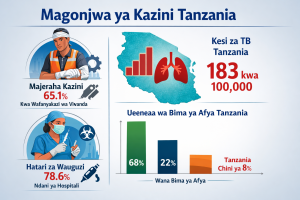
Catalyzing Exports in East Africa’s Cross Border Trade: The Question of Development Financial Institution in Mobilizing Private Capital
Lessons from Ethiopia
In an effort to catalyze Ethiopia’s Agricultural exports, the UK’s British International Investment (BII) and Dutch FMO are committing up to $20m each to Ethiopia’s Dashen Bank to support agricultural development. The move will provide long-term funding to the country’s financial service sector and serve as a lesson for East African countries in enhancing capacity for cross-border commerce by facilitating credit access to entrepreneurs and traders. This bold step marks the first instance of foreign institutions providing long-term funding to Ethiopia’s financial services sector under a new intermediation directive for banks, a strategy that countries can adopt to enhance East African trade Integration.
The need for enhanced access to investment capital comes amidst efforts to enhance regional integration under the East African Community and the African Continental Free Trade Area investment protocol creating a harmonized market for the region. Dashen Bank, one of Ethiopia’s largest private sector banks, serves as the conduit for this transformative initiative, providing support to export-oriented agribusinesses. This lays a road map for East African nations to pursue collaborative efforts between development finance institutions, locally and internationally, to catalyze the market, instill confidence in international and domestic investors, and mobilize private capital for investment.
The implications of this development are profound. East African nations can draw several lessons and strategies from this investment commitment to elevate their capacity for cross-border trade, foster regional integration, and unlock economic growth and development.
Attracting Foreign Investment: A Catalyst for Growth
The commitment of foreign investment from institutions like BII and FMO underscores the importance of attracting foreign direct investment (FDI) to East Africa. The collaboration seeks to inject capital through loans to cover the costs of importing machinery and helping farmers with attributes such as harvesting, logistics, and processes to boost productivity and drive increased export earnings from Africa. Foreign investment inject capital, expertise, and international networks into the region, invigorating local economies and spurring growth as is with the Ethiopian agricultural sector which accounts for about 90% of the country’s foreign currency earnings and employs 80% of the population contributing 39% to the GDP.
While such practices can be implemented in the African sector, East African nations’ prioritization depends on sectors and their contribution to cross-border commerce earning, employment metrics, and contribution to GDP. Thus, East African nations should actively court FDI by creating an environment that is conducive to investment when pursuing development finance institutions to support production for domestic consumption and cross-border trade. Conditions such as political stability, legal protection of investors, and regulatory transparency are imperative in courting loans and trading capital for traders. It suffices that harmonizing trade policies for the region under the East African Community and the AfCFTA investment protocol can make the region an attractive destination for international investors keen on expanding their footprint and support production for export markets.
Collaborative Efforts: The Strength of Unity
Partnerships and collaboration, such as the one demonstrated between BII and FMO, hold significant potential for the East African region. Capitalizing on their comparative advantages to boost cross-border trade, East African countries can pursue collaboration between local and foreign finance institutions to support private capital generation for trade and production. Collaborative efforts can boost capital provision efforts to support export-oriented businesses. Access to capital has been a challenge in cross-border trade among trading partners within the region limiting productivity and the adoption of modern technology and practices especially among small and medium-sized enterprises. Collaboration with muscled foreign entities across the continent and beyond can help pool resources, knowledge, and expertise for the development of critical infrastructure and financial institutions.
By working together, nations can overcome the challenges that might be insurmountable individually to further open cross-border trade in the region. The East African Community (EAC) provides a relevant model for regional collaboration encompassing Burundi, Congo, Kenya, Rwanda, South Sudan, Tanzania, and Uganda. It is therefore not lost on the nations that these collaborative efforts can aid in the pooling of resources and harmonizing policies to ensure that the EAC creates a single market, boosts trade, and facilitates cross-border investment backed by adequate productivity.
Financial Sector Development: Going Beyond
An efficient and robust financial services sector is the backbone of cross-border trade. If the collaboration between BII and FMO with the mediation of a local banking intermediary in Ethiopia is anything to go buy, more development efforts on the sector are needed within the region to support capital provision for cross-border trade. Investments in the banking sector, payment infrastructure, and credit facilities can facilitate trade finance and provide businesses with the necessary capital to expand and trade internationally. This builds the capacity for the youthful and women-dominated small and medium-sized business economy in East Africa towards better cross-border trade outcomes. Dashen Bank’s role, with over 800 branches locally, in facilitating agricultural development in Ethiopia exemplifies the importance of strong financial institutions in supporting export-oriented businesses. It is imperative that East African nations invest in strengthening their banking systems to provide the necessary financial tools for businesses looking to venture into international markets.
East African nations should focus on sectors with export potential, such as agriculture and manufacturing, and provide tailored support to help these industries thrive on the global stage. This calls for collaboration between the private sector and governments through incentives, training programs, and resources to help businesses become competitive in international markets. Investing in digital finance infrastructure is a critical step in supporting the banking sector’s efforts towards funding cross-border trade in the East African community. Moreover, this emphasizes the need for encouraging participation in regional and international trade agreements to open doors to new markets and create opportunities for cross-border trade. The African Continental Free Trade Area (AfCFTA), in particular, is a game-changing agreement that has the potential to reshape trade dynamics across the continent that could shape capital investment for business in the region.
“It is imperative that East African nations invest in strengthening their banking systems to provide the necessary financial tools for businesses looking to venture into international markets.”
East African countries should take advantage of these agreements to diversify their export markets and foster closer economic ties with their neighbors especially in generating investment capital for businesses to trade. By attracting foreign investment, fostering regional collaboration, enacting supportive policies, and focusing on crucial sectors like agriculture and infrastructure, East African nations can position themselves as vibrant hubs for cross-border trade, driving economic growth, regional integration, and shared prosperity across the region.
Muoki Musila is an Kenyan based economist. He is the communications and marketing associate at Liberty Sparks. These are the writer’s own opinions and do not necessarily reflect the viewpoints of Liberty Sparks. Do you want to publish in this space? Contact our editors at [email protected] for further clarification.



